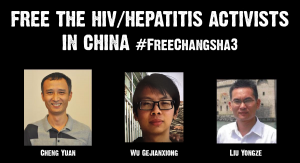Three Chinese lawyers and advocates, Cheng Yuan, Wu Gejianxiong, and Liu Yongze, who work on employment discrimination and disability justice for people living with HIV and viral hepatitis, have been wrongfully detained in Hunan, China since 22 July 2019.
The Canadian HIV/AIDS Legal Network sent a letter to the Chinese delegation of the UNAIDS Programme Coordinating Board (copied to the Chinese ambassador to Canada and to Ms. Carlsson as acting Executive Director at UNAIDS).
Dear Mr. Li and colleagues on the delegation of the People’s Republic of China to the UNAIDS Programme Coordinating Board:
We write to share our urgent concerns about the human rights of three prominent anti-discrimination lawyers and activists who have been detained and face possible charges of state subversion.
Cheng Yuan, Liu Yongze and Xiao Wu of the non-governmental organization Changsha Funeng have done important work to end discrimination against people living with HIV and people with hepatitis, and to advance the right to health and rights of persons with disabilities in China. As chair of the Programme Coordinating Board (PCB) of UNAIDS, which has set a goal of zero HIV-related discrimination by 2030, China should uphold the legal rights of these three activists.
Cheng Yuan has led over a decade of ground-breaking impact litigation on health rights—first at Tianxiagong, and later as co-founder of Changsha Funeng. Two of his landmark cases, in 2013 and 2016, won damages for teachers who lost their jobs due to their HIV status. Cheng Yuan has also led work on hepatitis B discrimination litigation and defending the rights of persons with disabilities.
On Monday, 22 July, Cheng and two colleagues, Liu Yongze and Xiao Wu, disappeared. Cheng Yuan’s wife, Shi Minglei, has nothing to do with his organization, but she has been placed under residential surveillance under suspicion of subverting state power. Cheng Yuan’s brother has also been questioned by police because of his vocal concerns about the case.
So far, their lawyers have not been able to meet with any of the three men being detained.
As chair of the governance board of UNAIDS, China plays a critical leadership role in the global HIV response. As you know, UN member states committed to the 2030 Agenda for Sustainable Development in 2015, and in doing so committed to ending HIV by 2030, to combating hepatitis, to promoting peaceful and inclusive societies for sustainable development, and to achieving “zero discrimination” against people living with HIV. UNAIDS, the Global Network of People Living with HIV (GNP+), UNDP and UN Women jointly launched the Global Partnership for Action to Eliminate All Forms of HIV-Related Stigma and Discrimination. To achieve this, UNAIDS recommends countries finance and support HIV-related legal services to reduce stigma and discrimination. It is exactly the kind of work in which Changsha Funeng has expertise.
China has ratified the International Covenant on Economic, Social and Cultural Rights, which upholds the right to health, as well as the Convention Against Torture, and has committed to many other human rights standards. China has signed the International Covenant on Civil and Political Rights, indicating the intent to comply with and implement that treaty’s provisions in good faith.
As chair of the UNAIDS PCB, China must not only uphold its human rights commitments, but set a positive example to the world of promoting UN commitments to end HIV and end discrimination, as well as international human rights law. Detaining human rights defenders who have advocated to protect people living with HIV and/or with viral hepatitis against discrimination runs directly contrary to the mandate of UNAIDS and to China’s own commitments.
We urge China to adhere to its legal procedures and protect the rights of Cheng Yuan, Liu Yongze and Xiao Wu to due process and legal counsel. We also urge you to raise with your government colleagues and counterparts in Beijing concerns about the harassment and intimidation of police towards Cheng Yuan’s family members
Sincerely,
Richard Elliott
Executive Director
cc: H.E. Ambassador Lu Shaye, Embassy of the People’s Republic of China in Canada
Ms. Gunilla Carlsson, Executive Director a.i., UNAIDS

